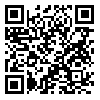Background & Aim: Adverse childbirth experiences as a trauma can evoke fear and post-traumatic stress disorder in some women. This study was conducted to investigate the effect of counseling on post traumatic stress disorder after a traumatic childbirth.
Methods & Materials: This research was a clinical trial which was conducted at Kamaly hospital in Karaj. Samples (300 women) who had experienced a traumatic childbirth were selected by a convenient sampling method and were randomized into an intervention (n=150) and a control (n=150) group. The intervention group received face-to-face counseling within 72 hours of birth for forty to sixty minutes in a session. The control group just received usual care after childbirth. The data collection tool was questionnaire, which was completed via interview. The measuring variables were demographic characteristic, reproductive history, maternity social support, and post-traumatic stress disorder. Data were analyzed using descriptive statistics and inferential tests (Chi-square, Fisher&aposs exact test, and generalized Fisher&aposs exact test) by SPSS v.13 software.
Results: After 4-6 weeks of follow-up there was no significant difference regarding post-traumatic stress disorder between two groups (P=0.295). At 3-month of follow-up, the intervention group reported less post-traumatic stress disorder comparing with the control group (P=0.001).
Conclusion: A midwife-led counseling plan is effective in reducing post-traumatic stress disorder during a long term.
| Rights and permissions | |
 |
This work is licensed under a Creative Commons Attribution-NonCommercial 4.0 International License. |


